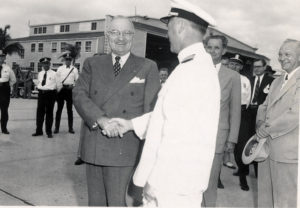
President Harry Truman at NAS Key West, FL, 1950
Right now, folks inside the White House are high-fiving each other, cracking open beers to celebrate Donald Trump‘s “win” in confirming Brett Kavanaugh to the U.S. Supreme Court. However, there’s probably at least one staffer running around, warning that the Kavanaugh confirmation process has galvanized Democratic voters for the upcoming midterm elections which are less than 30 days away. This comes on top of voter enthusiasm levels that already favor Democrats this year. In particular, Democrats have a very good chance of winning back majority control in the U.S. House of Representatives. (The Democrats’ Senate forecast is not as good, largely because this year, many more Democratic than Republican Senate incumbents are up for re-election.)
Thus, some White House advisors likely are telling Trump that, to prepare for a possible Democratic House beginning in January, Trump will have to act like Harry Truman. You may recall that Democratic President Harry S. Truman won re-election in 1948 largely by running against the Republican majority “Do-Nothing Congress.” In Trump’s case, that’s likely to be one-half of a Congress. Therefore, we can call the likely Trump strategy “Half a Harry.” Here’s why that strategy probably won’t work for Donald Trump:
First, Trump is no Harry Truman. Truman was Vice-President to Franklin Roosevelt, who led the U.S. out of the Republican Great Depression, and led us to the brink of victory in World War II, dying less than one month before Germany’s surrender, followed shortly thereafter by Japan’s surrender. Truman took office humbly, with the great love of the nation and the fallen president bestowed upon him. Truman successfully continued Roosevelt’s efforts to win the war, even taking the fateful decision to drop atomic bombs on Hiroshima and Nagasaki in order to shorten the war and avoid a U.S. invasion of Japan. Truman’s approval rating reached 91 percent during this period, with a disapproval rating of just two percent. It was truly a time of American unity.
Needless to say, Donald Trump is no uniter. After promoting Obama birtherism, Trump launched his 2016 campaign on divisiveness, saying about Mexican immigrants:
They’re bringing drugs. They’re bringing crime. They’re rapists.
Trump continued the divisiveness with his Muslim ban, his hiring of bigots like Stephen Bannon, and his praising of neo-Nazis in Charlottesville, Virginia as “very fine people.” As a result, Trump’s approval ratings did not start out on a note of national unity, and have remained low most of the time since then.
Second, Harry Truman wasn’t born with a silver spoon in his mouth. He grew up on a farm in Missouri and became a family farmer, then served in the Army during World War I and became a captain and commander of troops. Following his military service, Truman went into business as a haberdasher, then served as a county judge and a Missouri-based federal official, leading to his election as U.S. Senator before becoming Vice-President and then President. His experiences grounded Truman as a plain-spoken man of the people.
Donald Trump’s background was almost the opposite of Truman’s, from receiving hundreds of millions of dollars from his father starting as a toddler, to avoiding military service due to phony “bone spurs,” to a record of business dealings and personal relationships characterized by cheating and controversy. In contrast to Truman’s world leadership, Trump gets laughed at by world leaders at the United Nations. Other than as a racist role model to some Republicans (primarily white men), Trump is in no position to speak for the American People against one house of Congress, especially the house that is elected by popular vote on a local district level.
Third, when Truman ran against the “Do-Nothing Congress,” both houses were controlled by Republicans. The 80th Congress was at odds with Truman, on items from taxes to civil rights. In contrast, Trump has had a majority Republican Congress for the past two years, and, even with a closely divided Senate, they have often voted with Trump, not just on Kavanaugh and other federal judges (including Supreme Court Justice Neil Gorsuch), but also on matters such as tax cuts for the rich and military spending. Assuming the Senate stays Republican after next month’s midterms, then Trump can still get his judges and other federal officials confirmed, still get his treaties ratified, still get legislation introduced, still get the Senate hearings he wants, etc.
Ultimately, with control of the Executive Branch, the Supreme Court and the U.S. Senate, if Trump complains he can’t get things done merely because of a Democratic-controlled House, that will make him look weak and ineffective.
So if Trump thinks he can channel Truman and go Half a Harry, then we say, have at it.
Photo by Florida Keys — Public Libraries, used under Creative Commons license. https://is.gd/cZ8pQ8


